The right product owners are at the heart of successful project development, ensuring clear alignment between business objectives and product features.
Product ownership requires a blend of industry knowledge, leadership ability, and communication skills, along with a deep understanding of customer and market needs.
Candidates can write these abilities in their resumes, but you can’t verify them without on-the-job Product Owner skill tests.
In this post, we will explore 8 essential Product Owner skills, 10 secondary skills and how to assess them so you can make informed hiring decisions.
Table of contents
8 fundamental Product Owner skills and traits
The best skills for Product Owners include Stakeholder Communication, Backlog Management, User Story Creation, Market Analysis, ROI Management, Agile Methodologies, Acceptance Criteria Definition and Vision Strategizing.
Let’s dive into the details by examining the 8 essential skills of a Product Owner.
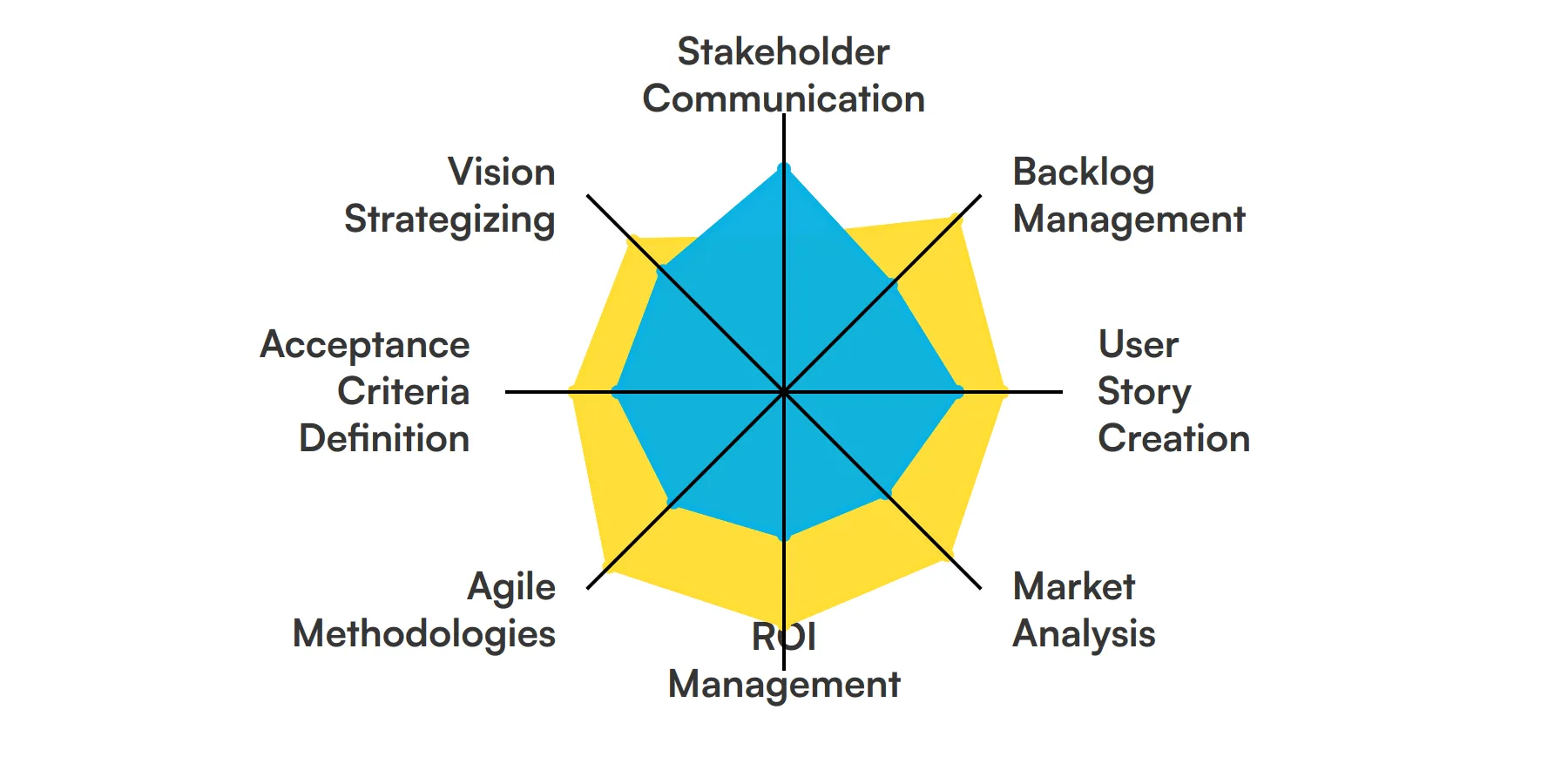
Stakeholder Communication
Effective communication with stakeholders is key for a Product Owner to align project goals and expectations. This skill involves articulating product vision, negotiating priorities, and ensuring all parties are informed and engaged throughout the development process.
Backlog Management
The Product Owner is responsible for maintaining a clear and prioritized product backlog. This involves understanding and synthesizing user needs and business goals to create actionable items for the development team, ensuring a smooth workflow and timely product enhancements.
For more insights, check out our guide to writing a Product Owner Job Description.
User Story Creation
Crafting comprehensive user stories is crucial for conveying requirements to the development team. A Product Owner uses this skill to break down complex product features into manageable, testable elements that drive effective development cycles.
Market Analysis
Understanding market trends and customer needs allows a Product Owner to make informed decisions about product direction. This skill involves analyzing competitive landscapes and identifying opportunities for innovation and differentiation.
Check out our guide for a comprehensive list of interview questions.
ROI Management
The Product Owner must assess and prioritize features based on their potential return on investment. This involves cost-benefit analysis and strategic decision-making to allocate resources effectively and maximize product profitability.
Agile Methodologies
Proficiency in Agile practices is essential for a Product Owner to effectively manage the product development process. This includes sprint planning, daily stand-ups, and retrospectives to ensure adaptive planning and continuous improvement.
For more insights, check out our guide to writing a Scrum Master Job Description.
Acceptance Criteria Definition
Defining clear acceptance criteria is crucial for ensuring that the development team delivers features that meet business and user needs. The Product Owner uses this skill to set measurable standards for product functionality and quality.
Vision Strategizing
The ability to develop and communicate a compelling product vision is fundamental for guiding the team and stakeholders. A Product Owner uses this skill to inspire and direct all aspects of product development aligned with long-term business goals.
10 secondary Product Owner skills and traits
The best skills for Product Owners include Technical Understanding, Data Analysis, Customer Feedback Integration, Risk Management, Resource Allocation, Negotiation Skills, Product Testing, Regulatory Compliance, Continuous Learning and Team Collaboration.
Let’s dive into the details by examining the 10 secondary skills of a Product Owner.
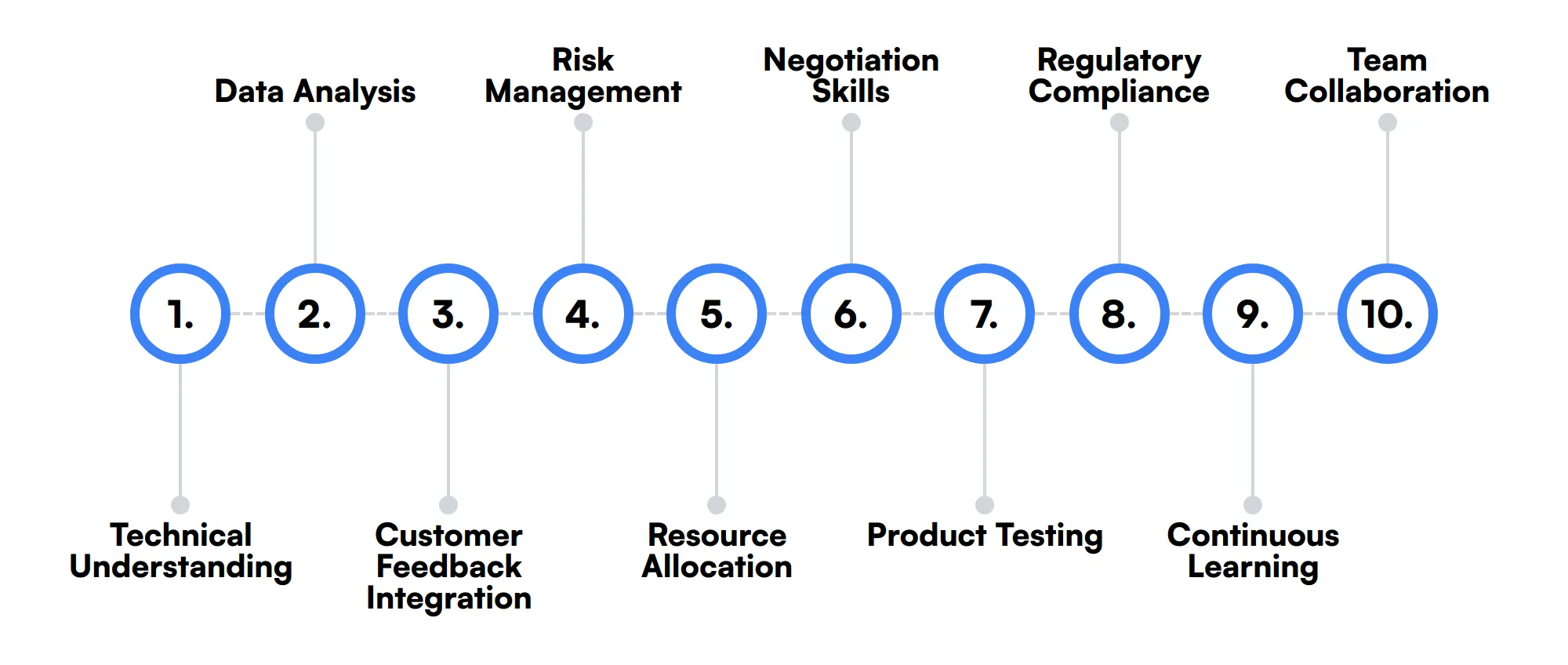
Technical Understanding
A Product Owner with a grasp of the underlying technology can make more informed decisions and communicate more effectively with the development team.
Data Analysis
Analyzing performance data helps a Product Owner measure the success of product features and make data-driven decisions for future improvements.
Customer Feedback Integration
Incorporating user feedback into the product development cycle is key for continuous improvement and user satisfaction.
Risk Management
Identifying and mitigating potential risks in the product development process ensures that projects stay on track and within budget.
Resource Allocation
Effectively distributing resources, including time and team skills, is necessary for maintaining efficient development cycles.
Negotiation Skills
Negotiating priorities and timelines with stakeholders and team members is a critical skill for balancing diverse interests and expectations.
Product Testing
Understanding and participating in the testing process helps ensure the final product meets quality standards and user requirements.
Regulatory Compliance
Ensuring that the product complies with relevant laws and regulations is important for avoiding legal issues and building trust.
Continuous Learning
Staying updated with industry trends, emerging technologies, and best practices is essential for keeping the product competitive.
Team Collaboration
Fostering a collaborative environment is crucial for encouraging innovation and maintaining high team morale.
How to assess Product Owner skills and traits
Assessing the skills and traits of a Product Owner can be a nuanced process. It's not just about what they know, but how they apply that knowledge in real-world scenarios. From stakeholder communication to backlog management, and from user story creation to market analysis, a Product Owner's role is multifaceted and demands a diverse skill set.
Traditional resumes and interviews often fall short in revealing a candidate's true capabilities. This is where skills-based assessments come into play. By leveraging tools like Adaface on-the-job skill tests, you can gain a clearer picture of a candidate's proficiency in areas such as ROI management, agile methodologies, and vision strategizing. These assessments can help you achieve 2x improved quality of hires and an 85% reduction in screening time.
Let’s look at how to assess Product Owner skills with these 5 talent assessments.
Communication Skills Test
Communication Skills Test evaluates a candidate's ability to communicate effectively in various professional scenarios, focusing on both verbal and written communication skills.
The test assesses candidates on their situational judgement, attention to detail, critical thinking, and verbal reasoning, providing a comprehensive evaluation of their communication abilities.
Candidates who perform well demonstrate strong interpersonal skills and the ability to convey complex information clearly and persuasively.
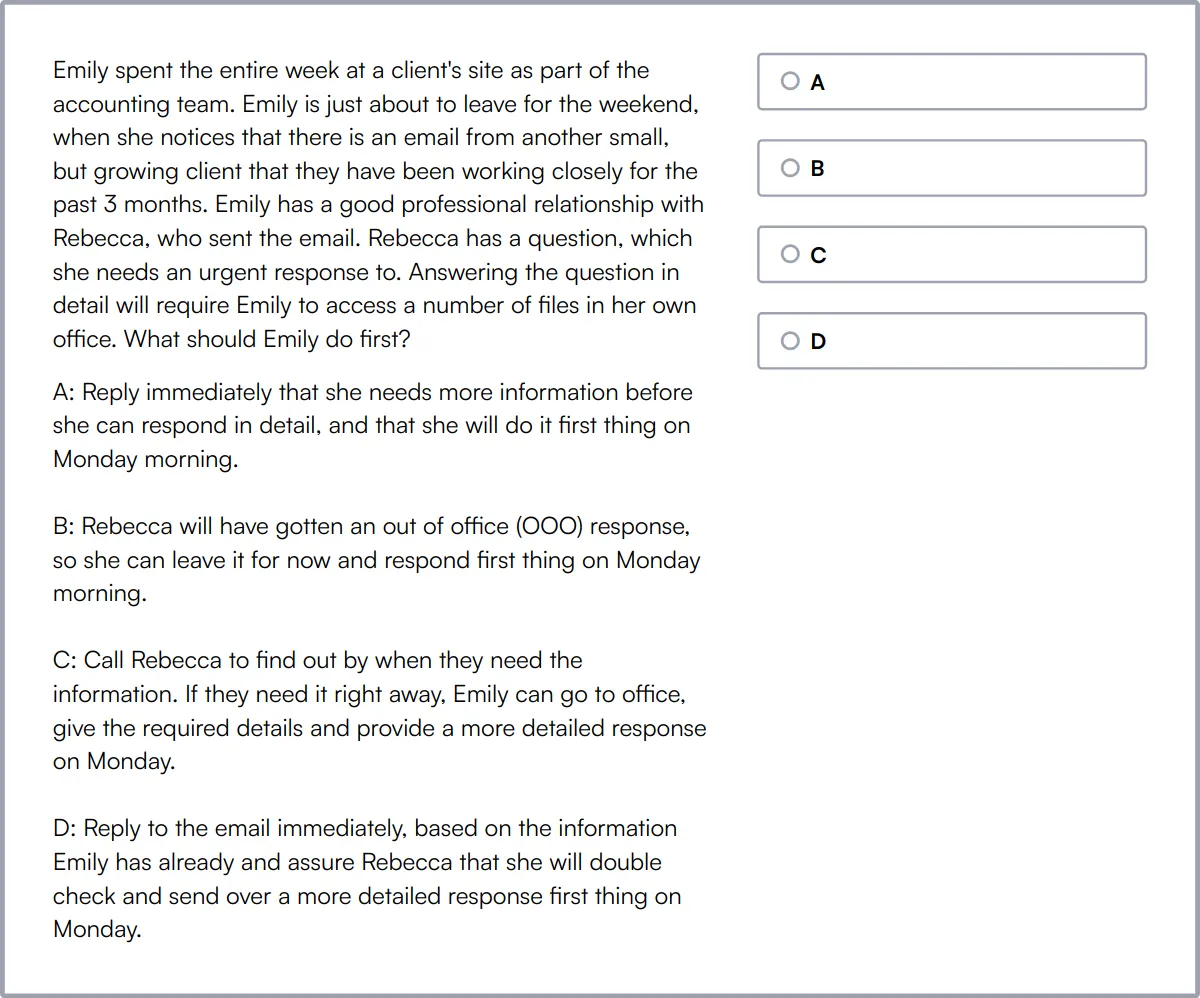
Product Owner Test
Product Owner Test focuses on a candidate's proficiency in agile methodologies and product management, crucial for effective product ownership.
This test evaluates knowledge in areas such as product backlog management, product vision and strategy, and stakeholder management.
High-scoring candidates will show a deep understanding of prioritization techniques, roadmapping, and the ability to align product features with business goals.
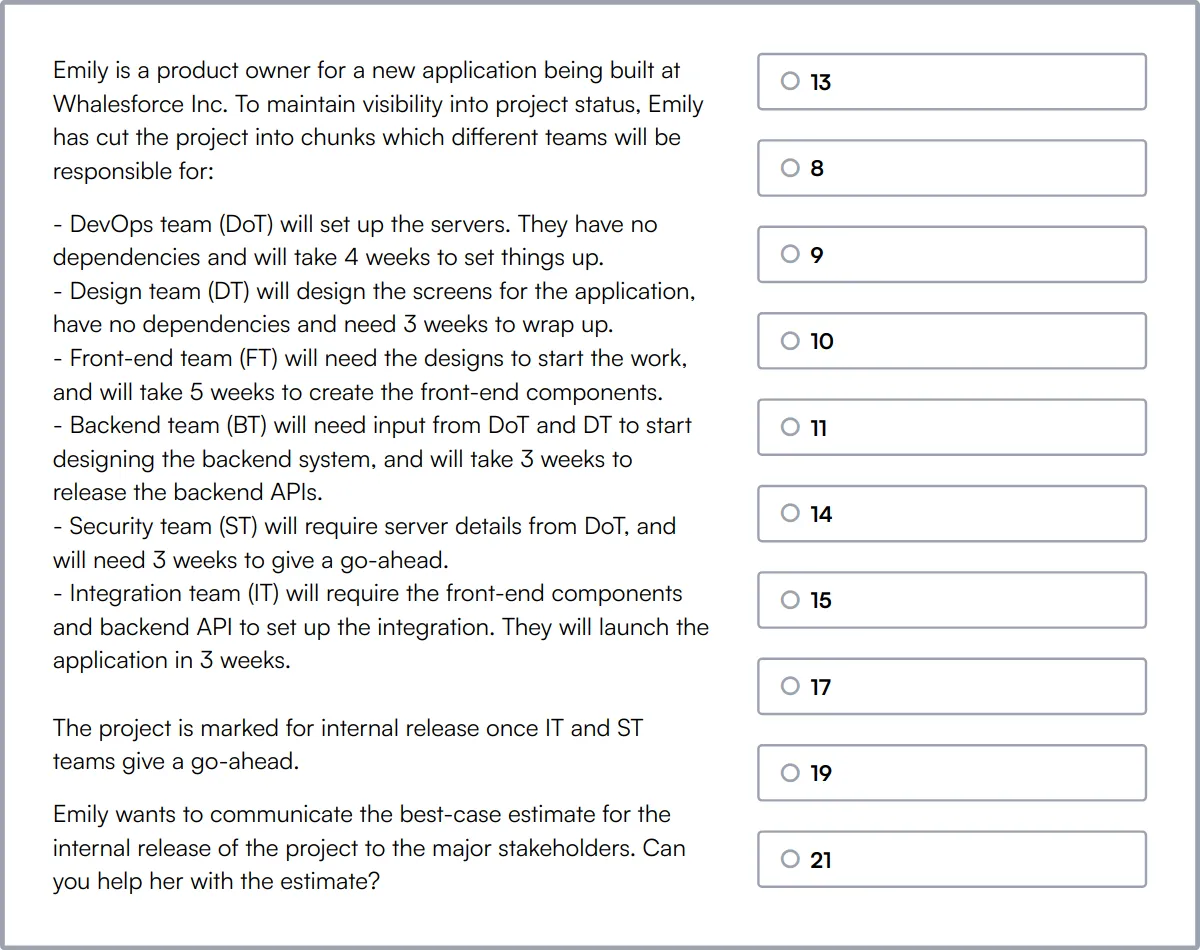
Market Research Test
Market Research Test assesses a candidate's skills in market research techniques and data analysis, essential for understanding market dynamics and customer needs.
The test covers market analysis, data interpretation, and quantitative aptitude, providing insights into a candidate's ability to analyze and leverage market data.
Effective candidates will demonstrate proficiency in extracting actionable insights from complex data sets, aiding strategic decision-making.

Financial Analyst Test
Financial Analyst Test evaluates a candidate's understanding of financial principles and their application in business scenarios.
The test challenges candidates on accounting principles, financial statements, and investment analysis, assessing their ability to manage budgets and forecast financial trends.
Candidates excelling in this test will display a strong grasp of financial compliance and risk management, crucial for effective financial planning and analysis.
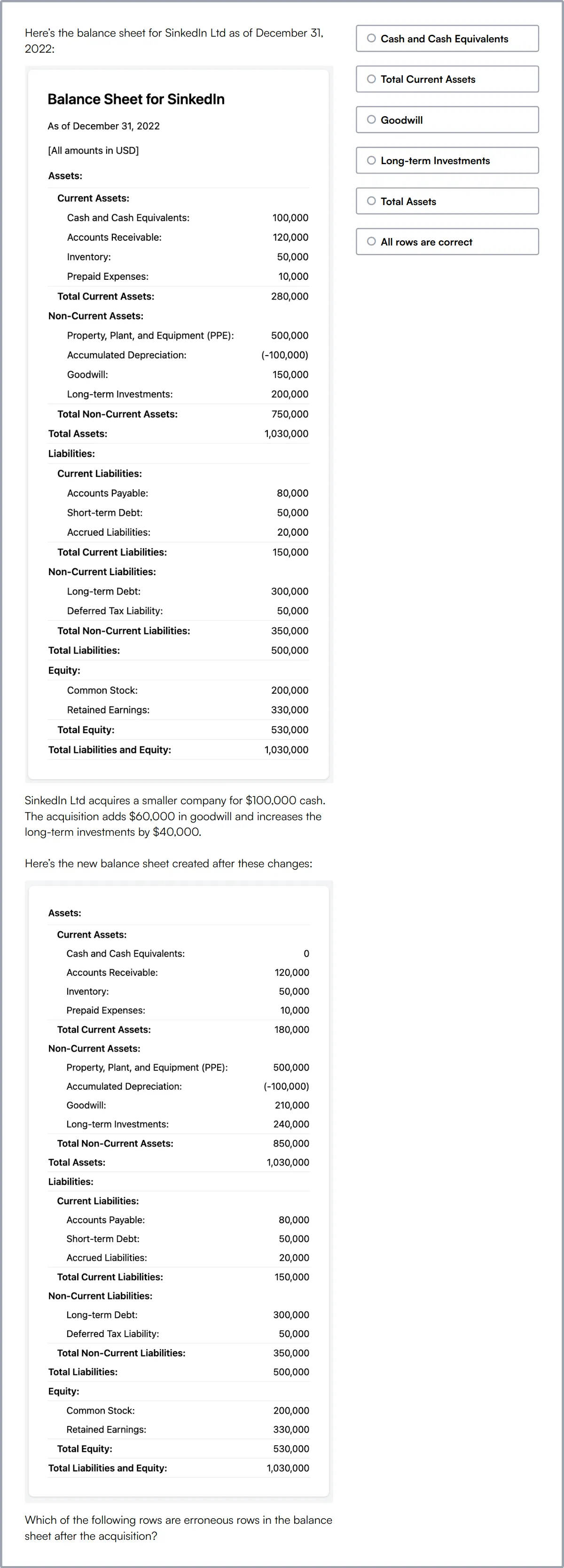
Scrum Master Test
Scrum Master Test measures a candidate's knowledge of the Scrum framework and agile principles, important for managing agile projects.
This test evaluates understanding of Scrum roles, artifacts, and events, including sprint planning and retrospectives.
Successful candidates will demonstrate a thorough understanding of daily stand-ups and iteration reviews, ensuring efficient project execution and team collaboration.
Summary: The 8 key Product Owner skills and how to test for them
| Product Owner skill | How to assess them |
|---|---|
| 1. Stakeholder Communication | Evaluate ability to convey ideas and gather feedback from stakeholders. |
| 2. Backlog Management | Assess how well they prioritize and organize tasks in the backlog. |
| 3. User Story Creation | Check proficiency in writing clear, actionable user stories. |
| 4. Market Analysis | Determine capability to analyze market trends and competitor strategies. |
| 5. ROI Management | Gauge how they measure and optimize return on investment. |
| 6. Agile Methodologies | Assess understanding and application of Agile principles and practices. |
| 7. Acceptance Criteria Definition | Evaluate skill in defining clear, testable acceptance criteria. |
| 8. Vision Strategizing | Check ability to create and communicate a product vision. |
Product Owner Test
Product Owner skills FAQs
What are the key skills a Product Owner should have?
A Product Owner should have skills in stakeholder communication, backlog management, user story creation, market analysis, ROI management, agile methodologies, and acceptance criteria definition.
How can I assess a candidate's ability in stakeholder communication?
Assess their experience in managing stakeholder expectations, conducting meetings, and their ability to articulate product vision and requirements clearly.
What is the importance of backlog management for a Product Owner?
Backlog management ensures that the team works on the most valuable tasks, prioritizes features effectively, and maintains a clear roadmap for product development.
How do you evaluate a Product Owner's skill in user story creation?
Review their past user stories for clarity, completeness, and alignment with business goals. Ask them to create a user story based on a hypothetical scenario.
Why is market analysis important for a Product Owner?
Market analysis helps in understanding customer needs, identifying market trends, and making informed decisions to stay competitive.
What methods can be used to assess a Product Owner's proficiency in agile methodologies?
Discuss their experience with agile frameworks like Scrum or Kanban, and ask about specific agile practices they have implemented in past projects.
How can a Product Owner integrate customer feedback effectively?
They should have a process for collecting, analyzing, and prioritizing customer feedback to ensure the product meets user needs and expectations.
What role does risk management play in a Product Owner's responsibilities?
Risk management involves identifying potential risks, assessing their impact, and developing mitigation strategies to ensure project success.

40 min skill tests.
No trick questions.
Accurate shortlisting.
We make it easy for you to find the best candidates in your pipeline with a 40 min skills test.
Try for freeRelated posts
Free resources



